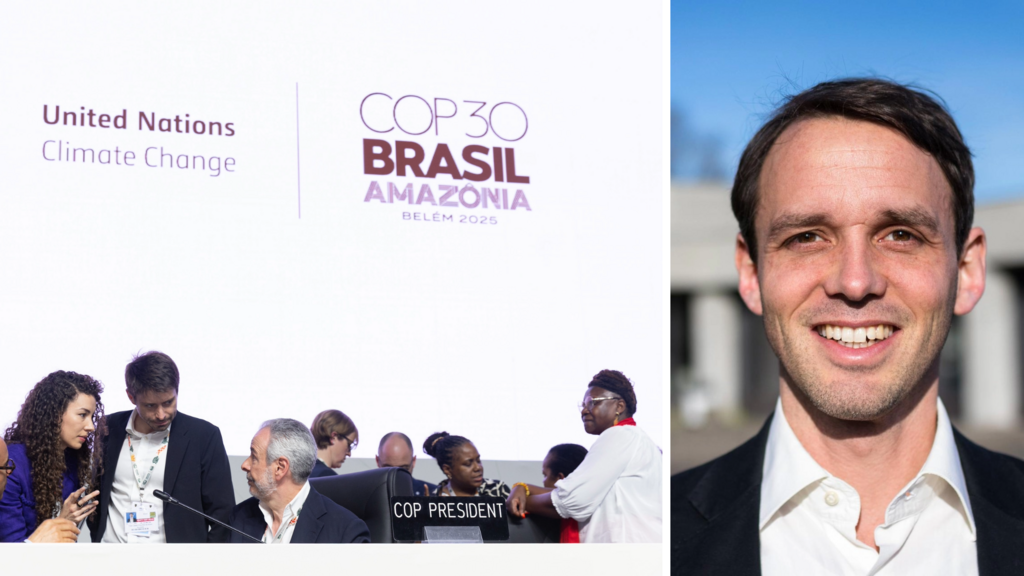Background - 24.11.2025 - 13:30
After the conclusion of the UN Climate Change Conference in Belém, Brazil, political scientist Klaus Dingwerth from the School of Economics and Political Science at the University of St.Gallen reflected on the conference and the main takeaways from the event.
Thinking of global climate cooperation in terms of eras, a first era would be after the Kyoto Protocol 1997. Here, cooperation was centred around command and control, and quantified emissions targets as well as timetables determined when developed countries had to meet these targets.
Phase two started with the Paris Agreement in 2015 and its decentralised cooperation in which every country determined its own national contributions to the protection of the world’s climate. The organising principles for this new logic of climate cooperation have been worked out over the past ten years.
The new era which should have began with COP30 in Belém sought to clarify into the Paris Agreement and its mechanisms and to set up future COP events as a way to accelerate international cooperation on climate mitigation and adaptation.
The hosts wanted parties to adopt various “roadmaps” that would spell out concrete steps and time-lines for key areas of climate politics. Their plan included a roadmap to 1.5 degrees, a roadmap to halt deforestation, a roadmap to transition away from fossil fuels in a just, orderly, and equitable manner, and a roadmap on mobilizing adequate climate finance.
In the end, COP30 was not the big leap that some had hoped for. In many ways, the results resemble those of previous climate conferences. Countries made progress on some issues – notably in their commitment to triple adaptation finance by 2035. Under the current circumstances, some observers also find it noteworthy that the conference did not roll back previously agreements as a success. But I would not count this as a success, and the fact that fossil fuels could not be mentioned is de facto form of backtracking from the language agreed upon at COP 28 in Dubai two years ago.
And then, of course, the roadmaps did not materialised. On deforestation and on the transition away from fossil fuels, the COP President instead announced in the concluding plenary that he would initiate a process to continue the international effort to develop them in the coming year. We will need to see what this initiative leads to.
One observation is that the rifts between countries became more visible in Belém than in previous years. A second observation is that many countries accelerate and deepen their cooperation increasingly outside the COP format.
The COP President’s invitation to proceed with roadmaps on deforestation and fossil fuels provides a possible path for “coalitions of the willing” to organize under the auspices of the UN climate pro-cess, and beyond the annual summits. The Tropical Forests Forever Facility (TFFF) for which Brazil managed to collect USD 6.7 billion and seeks USD 25 billion until the end of next year, operates out-side the UN framework. And the European Union’s Carbon Border Adjustment Mechanism (CBAM) that will come into effect in 2026 stands for a regional “climate club” approach to put a prize on car-bon emissions. So a lot of things are happening, and some of them are happening outside the COPs.
Third, the fight over fossil fuels put a spotlight on links between climate protection and the global financial system. We might think that, if a country wishes to “transition away from fossil fuels”, it can simply do so, and that this process therefore does not need to be organized internationally. But producer countries like Colombia face “tumbling energy company share prices, IMF questions about debt repayments and credit rating agency concerns about investment ratings” when they develop plans to reduce or even end oil exports. Their ability to “transition away” thus depends on interna-tional support to reduce these risks. And on the other side, Saudia Arabia’s persistent objection to the inclusion of language related to fossil fuels in COP decisions is equally motivated by the signal such language could send to financial markets.
The annual climate summits will no doubt remain important to allow governments to take stock of what has been achieved. We will need to see what happens to the roadmaps. The decisions adopted in Belém also includes a promise to establish a “Global Implementation Accelerator”. But the idea that a consensus-based process with over 190 parties will be able to accelerate anything is a difficult one. Ultimately, other accelerators will be more important – for instance an economy that is already transitioning fast; forums in which smaller groups can deepen their cooperation; the institutional interfaces that bridge climate politics with other policy areas to which it remains intimately connected.
Image source: CC BY-NC-SA 4.0, UN Climate Change - Kiara Worth
More articles from the same category
This could also be of interest to you
Discover our special topics
